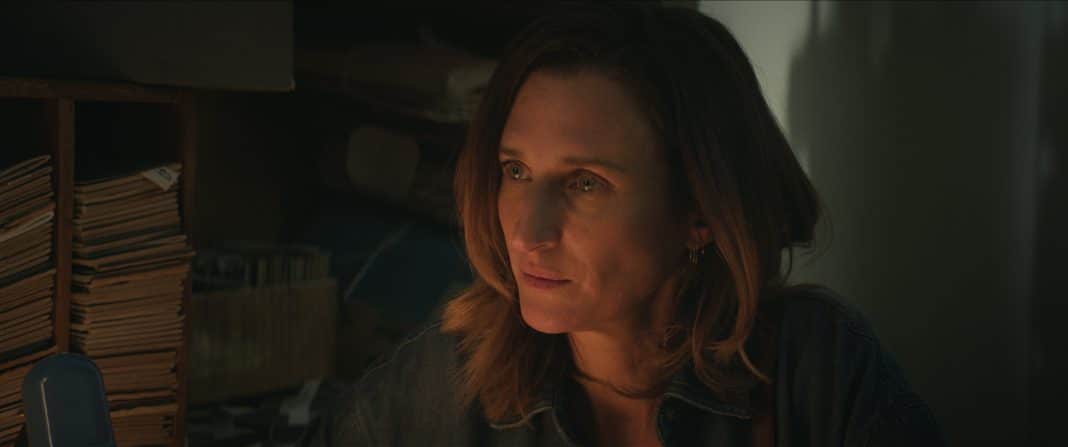The question hangs over “In the Land of Arto,” and it’s not a small one: Why does Celine — a Parisian mother who seems allergic to risk — haul herself all the way to Gyumri, Armenia? Tamara Stepanyan's debut doles out the answer like a half-buried confession. Six months ago, her husband killed himself with a gun. Now she’s here to get his birth certificate so their kids can claim Armenian nationality. A gesture toward heritage, toward roots.
Except… why couldn’t she just do that at the Armenian Embassy in France?
By fifteen-minute mark, she’s hit the bigger shock: her husband lied about who he was, changed his name, and left behind a dark past. But the film never answers the practical question. There’s no organic reason for this trip. It exists because the script wills it into being.
That’s an issue, because Celine (Camille Cottin) isn’t cut from the cloth of the natural explorer. She’s timid, unsure, almost painfully gullible — the kind of woman who would hand over her handbag, with every essential inside, rather than stare down trouble. Would she really leave her kids, cross into a country she hasn’t researched, and throw herself into the mess her husband left behind? Especially a place like Gyumri, with the memory of the 1989 earthquake still in its walls, the shadow of the genocide, the raw nerve of Nagorno-Karabakh? You’d think she’d at least Google it.
But no — she goes because Stepanyan needs her to. She needs a protagonist who can be tested, stripped of illusions, and made to bury the love she once carried. And the director wants to braid that personal arc with the country’s traumas: the quake, the war, the displacement of 120,000 Armenians.
The opening hints at a different movie. Celine on a train, sunlight hitting her face from shifting angles. Stepanyan cuts it like a prism — same moment, different perceptions. It’s a motif about truth: you have to see it from more than one side. Then the train breaks down. Passengers walk the rest of the way. Later, when Celine learns of her husband’s lie, the metaphor clicks — she’s walking again, alone, toward a truth she didn’t ask for.
What’s less sturdy is the screenplay. It strings events together like beads on a thread: colorful, maybe, but without a strong weave. Characters bump into each other because the plot says so. Arriving in Gyumri, Celine just happens to get a taxi driver who speaks French, who just happens to know people tied to her husband, who just happen to lead her to his former fiancée, with whom she and Arto's friends from wartime she meets — in a room lit like an interrogation cell. There she’s handed his Russian Makarov pistol, one bullet still inside.
That’s how she learns he fought in the war, disobeyed orders, got men killed, then ran to France. It shakes her. But the reveal drops like a chunk of backstory pulled from a file — efficient, not dramatic.
The film doubles down on coincidence. Enter Arsine (Zar Amir Ebrahimi), an Iranian-Armenian with a live-wire presence. She happens to be in the lobby of the same hotel where Celine’s staying, when the pistol’s disassembled parts hit the floor. And — another coincidence — she becomes Celine’s guide and confidante.
By the end of the first third, the viewer’s asking: Why doesn’t Celine just go home? What is she still here to find? Arsine’s father asks the same question late in the film. Stepanyan holds the answer until the end. Closure is the closest guess.
Stepanyan threads her identity-and-history motif into gestures, objects, and loaded bits of dialogue. Sometimes it hits. Sometimes it’s too much. The billiard-hall pistol scene lands: Celine lays the cloth with the Russian Makarov parts; Arsine assembles them. The untouched bullet — the one Arto didn’t fire in war but in a way used years later, in another form, to kill himself — becomes the truth Celine’s pieced together: something that could kill her too, unless she stops waging war on herself.
Celine and Arsine are set up as mirrors in reverse. Celine is hesitation personified, plain in look and stance. Arsine is pure Venus — self-possessed, in command, able to bend her man to her will. The unspoken idea: Celine will take a trace of that power home.
Amir Ebrahimi plays Arsine with lived-in charm. Cottin gives Celine the stillness of someone absorbing shocks in real time. Neither goes for fireworks, but both belong in this world.
The film’s final beat lands with the kind of clarity the rest has been straining for. In Aghdam, standing over the graves of the war dead, Celine fires the last bullet into the sky. Not to kill. To clear the chamber. To put something down — for herself, for the fallen, for anyone still locked in a private war. It’s the rare gesture here that doesn’t need unpacking.
The message has weight. The delivery doesn’t always. “In the Land of Arto” has an eye for visual texture, for symbols that try to braid grief with national history. But the logic gaps, the coincidences piled like bricks, the motifs repeated past their effect — they keep the story from locking into place. The bullet Celine fires is meant as closure. In storytelling terms, it’s closer to a near miss.
“In the Land of Arto” (“Le Pays d'Arto”)
Venue: 78th Locarno International Film Festival (Concorso Internazionale)
Production: La Huit, Pan Cinema, Visan. Producers: Stéphane Jourdain, Camille Gentet. Executive Producer: Flavia Mazzarino. Co-producer: Tamara Stepanyan.
Crew: Director: Tamara Stepanyan. Screenwriters: Tamara Stepanyan, Jean-Christophe Ferrari, Jean Breschand, Romy Coccia di Ferro, Jihane Chouaib. Director of Photography: Claire Mathon. Editor: Olivier Ferrari. Sound: Olivier Mauvezin, Jean-Marc Schick, Bruno Reiland, Nathalie Vidal. Original Score: MARC Ribot.
Cast: Camille Cottin, Zar Amir Ebrahimi, Shant Hovhannisyan, Hovnatan Avedikian, Alexander Khachatryan, Babken Chobanyan, Hasmik Suvuryan, Hrach Movsisyan, Manvel Khachatryan, Arsen Saghatelyan, Christine Hovakmiyan, Denis Lavant.
France/Armenia.
104 minutes,
in French, Armenian, English
